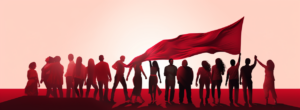Personalisation: a pandemic learning curve for the HR function
- 5 Min Read
The need for personalisation in business has been amplified by COVID-19 – but will we maintain it?
- Author: Dave Ulrich
- Date published: Mar 1, 2021
- Categories

Whenever a crisis occurs, key takeaways always emerge. After the September 11 2001 attacks in the United States, improving relationships was a priority and American keepsakes were popular; but over time, relationship challenges returned and American hoopla declined. And after the 2008–2009 global financial crisis, individual, corporate, and government debt declined, but now debt is as high as ever.
The crises (global pandemic, social injustice, political quarrels, economic variability) that have occurred during past last 12 months are no different. There is bound to be a lasting legacy, but the question is ‘what?’.
I have heard many thoughtful answers: advancing the digital revolution; redefining work boundaries to include virtual work; increasing social citizenship with an emphasis on diversity; harnessing uncertainty through agility; renewing relationships with family and friends; managing emotional resilience. You fill in the blank.
Personally, however, I hope the lasting legacy is personalisation.
Focusing on the person
Personalisation is about the person. When we think of this topic in the world of business, we can refer to a number of different facets: emotion, empathy, engagement, experience, efficacy, and so on. These words tend to show up with greater frequency as the working world becomes more progressive.
When last year’s physical challenges came, the emotional needs of the afflicted and those associated with them mattered as much as physical needs. As a result, many organisations have recognised the need to become communities where employees find resources that provide personal, emotional support.
Empathic leadership will hopefully be the new norm as leaders begin to both listen to and hear their employees. With empathy, respecting differences is less an event and more an ongoing habit.
Employee experience has become a critical element of the work experience as employees believe (find meaning), become (learn and grow), and belong (connect with others). Employee experience is a lead indicator of customer experience and investor confidence.
With the increased turmoil around us, many have had to discover their personal efficacy by defining and redefining what success means. Instead of tracking public activity (e.g. meetings attended, flights taken, goals accomplished), success has become more about private reflections on values recognised and realised (such as caring for and reaching out to others, learning new skills).
Hopefully these elements of personalisation will remain even as the world reopens.
Personalising work
Crucially, personalisation also refers to creating more bespoke, tailored solutions at both the individual and organisational level.
At the individual level, as the French phrase à chacun son goût implies, no two people are alike. The recent crises reinforce differences: sacrificing work for family, working virtually versus in person, acquiring new digital skills, having divergent political views, coping with the emotional demands differently, and defining success differently.
The diversity movement reminds us that we are all different. As a simple exercise, you are unlikely to find someone in the same room at work wearing the same pair of shoes that you wear. The shoes that you like are not likely worn by others even in your same social network. But much more profound than shoes, individuals differ in their demographics (e.g. race, gender, age, education, lifestyle), professional ambitions and personal goals.
Personalisation at work then means that while different, everyone has something to offer to help the collective organisation or community become more than the individual parts. That offering may be a perspective, skill, or experience. Leaders who appreciate diversity and yet establish unity create adaptive, innovative, and agile organisations.
These leaders don’t start by telling others what to do, but they discover what matters to each employee and then help them recognise that he or she can meet personal goals by engaging in the collective organisational goal.
Leaders often assume that others may want what they want and therefore act the way they would act. However, a leader with ambition to be promoted, for example, may have to recognise that someone else may want more time off for personal reasons. Instead of this leader assuming others will have his or her ambition, they can help others reach their goals through their unique contribution to the organisation.
Acknowledging individuality
At the organisational level, personalisation moves attention from benchmarking and best practices to guidance (where leaders focus on what matters most to their organisation).
Comparing an organisation’s human capital (or other) investments with another’s is no longer enough – leaders need to define their organisation’s unique (and personalised) human capital requirements based on the desired outcomes. An organisation working to reinvent its strategy from product to service or to a more digital platform may have different human capital requirements than an organisation working to gain market value or customer share.
The work we have done through our Organization Guidance System (OGS) helps leaders personalise and tailor their human capital investments. By starting with clarity about the results an organisation seeks, leaders can then identify which human capital investments will accomplish those results. We have helped organisations assess which of five outcomes they want to achieve and which of 37 human capital initiatives they should focus on to make the outcomes happen. In another post, I will discuss the implications of these findings. Simply stated here, personalisation helps organisations know where to focus investments to deliver key outcomes.








